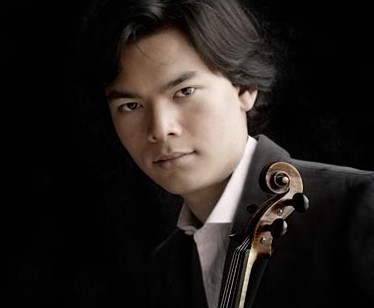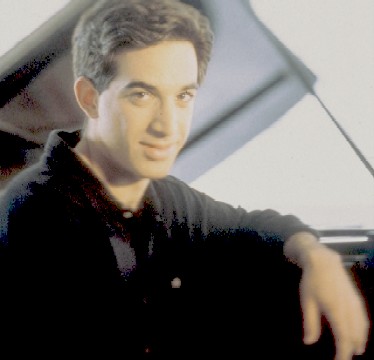
V iolinist Stefan Jackiw and pianist Max Levinson performed last night at Kansas City’s Folly Theater, as part of the Harriman-Jewell 45th season.
- Beethoven: Sonata No. 1 in D major
- Copland: Sonata for Violin and Piano
- Lutosławski: Subito
- Brahms: Sonata No. 3 in D minor, Op. 108

F or me, the highlight of the evening was the performance of Witold Lutosławski’s ‘Subito’ for violin and piano. Lutosławski was noted for his striving to achieve a unity of effect and expression through a 'system' of composing, for his love of drama, and for his penchant for high-saturation coloristic effects. Jackiw’s tendencies align perfectly with Lutosławski’s.
M akes me wonder what Jackiw would do with Debussy’s violin and piano Sonata, L.140... Color for color’s sake.
E mphasis on small-scale, phrase-length features... anticipating the very next interval, the current ‘arc’. ‘Operatic’ sense of drama and discovery!
C all it ‘animated canon’—reverential, recursively referential to what has gone before, sentiment upon sentiment, until you are airborne.
M ore than this, Jackiw’s violinistic ‘voice’ is both liminal and abject in its submissiveness to the atmospherics as they unfold. The fascination with boundaries and liminality is sometimes forceful, as in the presto agitato of the Brahms, and at other times delicate in the andante semplice and lento of the Copland. Delicate, delicate vibrationless decrescendos, vanishing into thin air.
N ot surprisingly, as an encore Jackiw frequently performs ‘Méditation’ from Jules Massenet’s opera ‘Thaïs’, a wonderful vehicle for Jackiw’s interpretive sense of where the ‘earth’ ends and the ‘sky’ begins.
E lizabeth Lorenzo (UCLA) has argued that Massenet intentionally imbues his female characters with aggression and overt sexuality, so much as to place them well beyond the realm of acceptable feminine conduct, exulting in their defiant refusals to be contained—rhetorically anticipating French feminism. In the instance of Thaïs, Massenet’s opera with a libretto by Gallet based on the novel by Anatole France, set in Egypt under Greek occupation, we have a Cenobite monk, Athanaël, who tries to convert Thaïs, an Alexandrian courtesan and devotée of Venus, to Christianity. Eventually Athanaël acknowledges that his obsession with Thaïs is really only lust... the licentious courtesan, pure of heart, opposite the outwardly abstemious religious man who is carnal and deluded through and through... an object lesson in religious eroticism vs. erotic spirituality?
S o Thaïs is afraid of dying; she knows beauty is only skin deep; a violin is only a mortal box with strings. After a bumpy struggle in her soul through the night she hooks up with Athanaël in the morning, to go with him to the desert. Later Thaïs is almost dead with fatigue—really bad case of the flu? we’re not sure what. Athanaël plunks her at the oasis—more boundaries and liminality—in the care of Albine and the nuns, and then returns to the desert. But he can’t get the beautiful woman he has “saved” out of his mind. He sees her in his dreams; he hears voices telling him she is dying. He goes and finds Thaïs on her death-bed/boundary. He tries to revive her, exhorting her with sweet carnal nothings, so inappropriate we can hardly believe it. But visions of heaven already occupy her mind, and she dies:“I see God” are her last words.
Y es, well. Massenet was fascinated by the conflict between the secular and the sacred. And a courtesan who turns from the God of Love toward the Love of God is sentimental Massenet in spades.
B ut for Jackiw such a piece is an exploration, not so much of an eternal tension/conflict between the divine and the carnal, but of pure emotion itself. Jackiw embodies not a revivified sentimental, dramatic Massenet or Copland or Lutoslawski but instead a fresh incarnation of the muse that makes a composer create these things in the first place.
W hich is actually a far more valuable and inspiring trick! Bravo!
J ackiw has performed with the Boston Symphony Orchestra, the Chicago Symphony, the Cleveland Orchestra, the New York Philharmonic, and the orchestras of Baltimore, Indianapolis, Milwaukee, Minnesota, Nashville, Oregon, Rochester, San Francisco, Seattle, and St. Luke’s, among others. Born in 1985, Mr. Jackiw began playing violin at the age of 4. His teachers have included Zinaida Gilels, Michèle Auclair, and Donald Weilerstein. Mr. Jackiw holds a B.A. from Harvard University, as well as an Artist Diploma from the New England Conservatory. In 2002, he was awarded the prestigious Avery Fisher Career Grant. These days, Mr. Jackiw makes his home in New York City.
- Stefan Jackiw website
- Max Levinson website
- Brown C, Norrington R. Classical and Romantic Performing Practice 1750-1900. Oxford Univ, 2004.
- Massenet sheetmusic at IMSLP.org
- Excerpt of Henry Finck writings on Massenet, BobsUniverse.com [1MB pdf]
- Finck H. Massenet and his Operas. Brewster, 2007.
- Harding J. Massenet. Da Capo, 2000.
- Huebner S. French Opera at the Fin De Siecle. Oxford Univ, 2006.
- Irvine D. Massenet: A Chronicle of His Life and Times. Amadeus, 2003.
- Rust D. conversation with Witold Lutosławski. The Musical Qt. 1995; 79:207-23.
- Lutosławski page at Polish Music Center
- Stucky S. Lutoslawski and His Music. Cambridge Univ, 2009.
- Massenet J. Thais - Meditation. Marsick transcription at VirtualSheetMusic.com
L utosławski sent the work to Rostropovich as it progressed, with explanations couched largely in terms of the work’s dramatic scenario, in which the cellist and the orchestra confront each other as adversaries. This concept appealed strongly to Rostropovich, and he developed a deep identification with the dramatic persona represented in the solo part.”
— Steven Stucky, Lutosławski and His Music, p. 92.